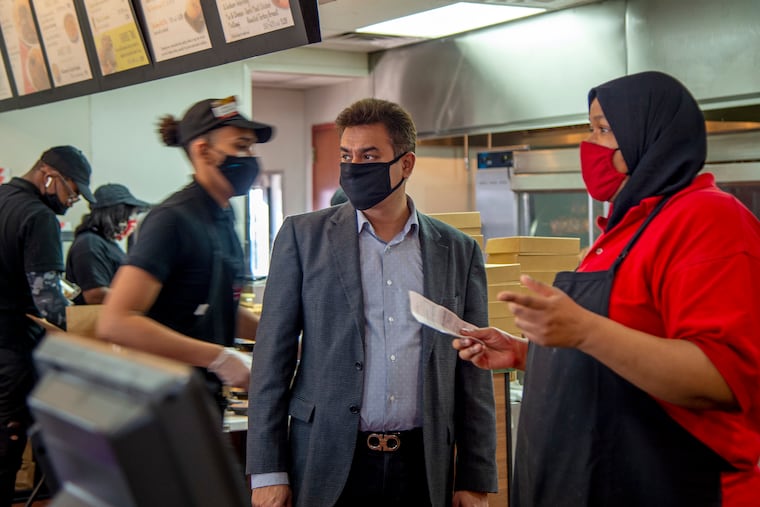This Bucks County man bought Corner Bakery and Boston Market. Here’s how he plans to rebrand the companies.
Jay Pandya, a longtime owner of franchise restaurants such as Pizza Hut, Dunkin' Donuts, and Arbys, is taking a new approach.

Although 2020 was a challenging year for the many restaurateurs who struggled to keep the lights on amid the pandemic, Jignesh “Jay” Pandya of Newtown expanded his business dramatically, buying two well-known, but struggling, privately held national restaurant chains.
In April, he acquired Boston Market, the rotisserie chicken specialist, adding 41 locations in 2020 for a total of 324. In October, he took over the 157-unit Corner Bakery, which offers pastries, breads, breakfast dishes, and sandwiches. Terms were not disclosed.
Pandya, 44, is now overseeing a rebranding and redecoration of the companies’ stores. He said he is also is considering a relocation of the main offices to Bucks County — Corner Bakery from Dallas and Boston Market from Golden, Colo. — and started hiring more staff, anticipating that business will improve in the second quarter of 2021. Pandya said he plans open 90 to 105 more Boston Market and 120 new Corner Bakery locations in the next year — effectively doubling its size.
By controlling the parent companies, Pandya is flipping his personal script. Pandya has been a franchisee for more than 20 years, operating dozens of Arby’s, Checkers, and Dunkin’ Donuts outlets, while controlling the real estate where the stores exist. For about 15 years, Pandya also was a Pizza Hut franchisee with 27 locations in the Philadelphia area and Connecticut before closing them in October 2019. Pizza Hut took him and his companies to federal court, alleging that they had failed to pay franchise fees and violated terms of their operating agreements. Pandya’s attorneys countered that they were underperforming. Pandya declined to comment on the suit, which court records suggest is headed toward mediation.
Meanwhile, the Pizza Hut name is all but gone from the Philadelphia area.
In 2019, Pandya acquired rights to Brazilian fried chicken company HNT Chicken, installed his older son Ronak, then 19, as its chief executive, and began to convert some of the shuttered Pizza Huts into HNT locations. Jay Pandya said HNT performed well in the months leading up to the pandemic but was not viable during the early months of the government shutdown orders so he closed them. He said he may revive it later.
Pandya also has given up his dream to start a cricket league in the United States but is working to build cricket stadiums. (Again with the real estate.)
I sat recently with Pandya, who immigrated to the United States from India at age 14 and graduated from Bensalem High School before dropping out of Drexel University at 19. (As a married father of two college-age boys, he said he was not proud of this.)
Just how large is your company now?
Five hundred-plus [restaurant units] in 35-plus states. Over 11,000 employees. ... I don’t know from the top of my head, but I do know it’s at least 11. Maybe 12, 13. Let’s say 11 to be safe.
How did you get the restaurant bug?
In school, I worked for a Mexican restaurant called Chi-Chi’s. When I worked there, I found that connecting people and speaking to and meeting people was something I always liked, so going into the restaurant or retail industry was a natural fit for me. From one restaurant to another, we started building and growing. When I first got into the Dunkin’ Donuts business, around the early 2000s, I remember thinking that I had built or acquired 24 restaurants in two years. I was doing one a month. I’m now opening one a week.
Tell me about real estate’s role in your restaurant business.
Real estate is what really matters. [If business struggles] you change the sign. It could be a Pizza Hut, it could be a Boston Market. It could be Arby’s. I am the one who’s spending money for a brand to develop and get to the next level. If you don’t get the same kind of support from the brand, you fail.
What attracted you to Boston Market?
I love the food. We just needed to figure out how it could be structured during the pandemic. [Boston Market has expanded to late hours with a menu of sliders and bowls, and is about to introduce a fried-chicken sandwich.]
You’ve had hits. What didn’t work for you?
I was the original person who brought Quiznos [a chain specializing in subs] to Philadelphia. The brand did not have support, did not have strength. I think I opened five and sold two or three, something like that. It was a setback. And eventually, little by little, Quiznos just pretty much disappeared. I think another setback was when we closed Pizza Huts. We had been struggling with that brand.
You have another business, I’ve heard. Something about home delivery, like Amazon?
[He balks at the answer.] The end goal is to deliver a product to every American within two hours. When we go back and look at this, two or three years from now, you will know what that meant.